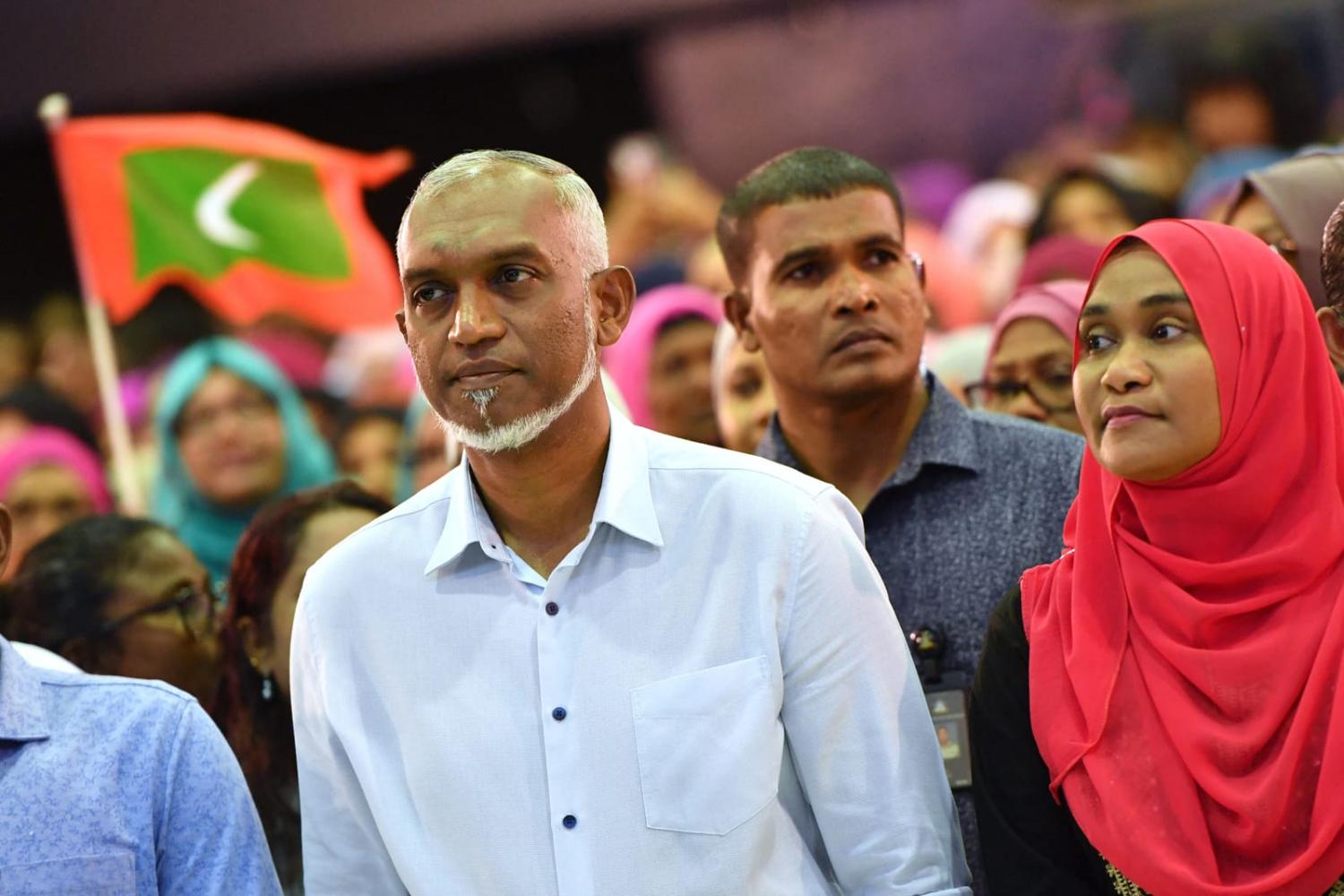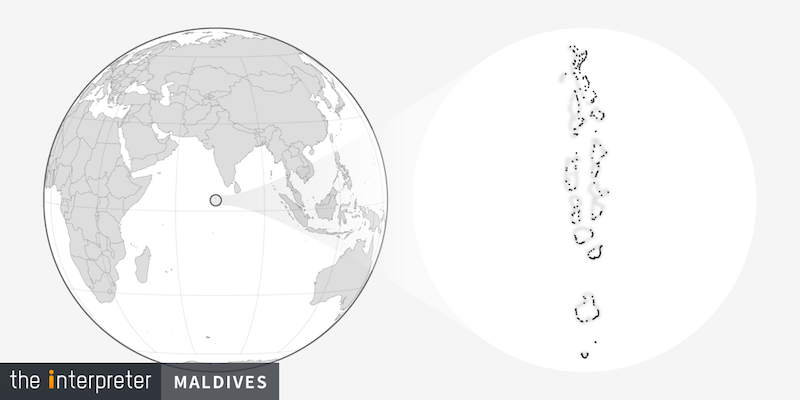A new government may be forced to straddle the India-China divide.

As competition between the major powers plays out in the Indian Ocean there are many consequences for small island states – including elections won or lost on the basis of political alignments with big countries. This week, incumbent Maldives President “Ibu” Solih lost an election in which the country’s close relationship with India was a central issue. But despite campaign slogans of “India Out”, the incoming president, Dr Mohamed Muizzu, will likely be forced to take a middle approach and seek to straddle the India-China divide.
For more than a decade Maldives has been the scene of much geopolitical jostling and intrigue among the major powers, principally India and China. This has had a significant impact on its domestic politics. Solih won a landslide victory in 2018 against the corrupt former leader Mohamed Yameen, who had made the country a poster-child for China’s so-called debt trap diplomacy. Yameen presided over a series of high profile infrastructure projects that involved large and often secret debts to China. Ultimately Yameen’s corruption became too much for the electorate to bare.
Solih made Maldives a model of good governance and rule of law, with a focus on anti-corruption and building democratic institutions in this relatively young democracy. In foreign policy, Solih took an unashamedly “Indian First” approach, declaring Maldives’ huge neighbour to be its key international partner. Solih also enhanced Maldives’ relations with other regional partners, including Australia, which recently opened an embassy in the Maldives capital, Malé.
Since 2018, India has been generous to Maldives, committing billions to bail the country out of a massive debts bequeathed by the former government, providing vaccines during the Covid pandemic and in its own announced infrastructure investments.
Many observers assumed that Solih’s record would give him strong grounds for re-election, but this was not so. While Yameen was languishing in jail for money laundering and thus disqualified from running, he backed Mohamed Muizzu, the relatively unpopular Mayor of Malé, as his candidate. Last Saturday, Muizzu romped home to an electoral victory with a 54% majority.
There were a few reasons behind Muizzu’s victory. A split in the governing Maldives Democratic Party led to a party rival Mohamed Nasheed, taking voters away from Solih. But the biggest factors were seen to be Solih’s failure to deliver big new infrastructure projects and the country’s close relationship with India. Muizzu played the “India Out” card early in the campaign, which was amplified by Yameen supporters, tapping into widespread concerns about domination by India.

In some ways the importance of the India factor in Maldives politics should be seen as inevitable. Maldives is a tiny nation of some 500,000 people, next door to the most populous country in the world. Maldives has a distinctive culture which it works hard to protect. A strong adherence to Islam (the constitution declares that non-Muslims cannot become citizens) should be seen as an expression of the country’s unique identity as much as a declaration of faith.
There is also considerable resentment against a small Indian military presence in the country, again reflecting concerns of domination. The Indian Navy and Coast Guard maintain small contingents to run a maritime patrol aircraft and two helicopters that provide search and rescue services, surveillance of the exclusive economic zone and medical evacuations. They are (unfairly) considered by many people to be interlopers and spies.
But even among informed Maldivians there is also disquiet that Indian officials went beyond normal diplomatic protocols in their dealings with the former government. This only contributed to rumours of secret military deals with India.
When Muizzu takes office he will likely face significant pressure to make good on campaign promises to downgrade the relationship with India (potentially even removing the Indian military presence) and to upgrade the relationship with China, including re-opening doors to Chinese investment.
Muizzu will also face significant pressure from Yameen’s supporters to release him from jail. While he does not have the legal power to pardon Yameen, he could, potentially, stack the Supreme Court with his appointees to overturn Yameen’s conviction, although that would involve a lengthy process. It is understood that Yameen is already being moved to house arrest.
Nasheed, the colourful former president who helped torpedo Solih’s re-election also has his own plans for power. In the weeks prior to the election he started a process to amend the Maldives constitution to change the country’s system of government from a presidential to a parliamentary system. If the constitution is ultimately changed (and it is a long process), then Nasheed would see himself as the natural candidate for prime minister and leader of the government.
In the meantime, Muizzu will need to find a path forward for Maldives foreign policy. While he was elected on the back of support from Yameen’s party, Muizzu comes from a quite different milieu from Yameen and his backers. Muizzu isn’t just a new Yameen. Muizzu may seek to create greater public distance with India, but is less likely to radically change Maldives’ foreign policy posture.
India’s Prime Minister Narendra Modi has already congratulated Muizzu on his victory, noting that “India remains committed to strengthening the time-tested India-Maldives bilateral relationship and enhancing our overall cooperation in the Indian Ocean Region”. It is understood that Muizzu has already met with Indian officials.
Ultimately, Muizzu will likely try to straddle the India-China divide, giving (perhaps, tacit) primacy to the India relationship in foreign policy and security, but also allowing closer economic engagement with China. That is what many countries in the Indian Ocean are trying to do. Such a path is difficult and risky for a small country and would involve dealing with many conflicting pressures. Delhi would also need to be prepared to play the game more on Maldives’ terms.
Jostling between big powers will increasing affect the stability of many smaller countries in the Indo-Pacific, particularly small island states. As the importance of island states grow, alignments with major powers will likely become an ever greater factor in domestic politics. As the Maldives elections has shown, if not handled well, in smaller states, perceived alignments with big countries can be electoral poison.
